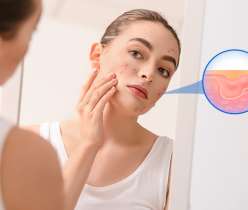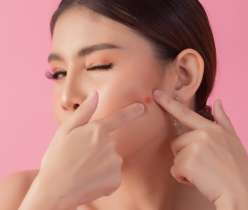Is acne a serious skin problem that requires medical attention? Well, it largely depends on the severity level of the individual case. Not every person looking to get rid of acne scars needs to consult a dermatologist for acne treatment. Acne is a prevalent skin condition that causes pimples, blackheads, and black spots. Such spots may remain with you even if you take acne remedies; this problem recurs after a few days. There are some effective and best acne creams available in the market, such as Persol Gel 2.5% (30 gm), Persol Gel 5% 30gm, Peroclin Gel 5%, Retino A Micro Gel 0.04% (15 gm), Aziderm Cream 20 % (15gm) and Supatret .04% Gel 20gm.
Dermatologists widely recommend these creams, but the question remains whether you should consult a doctor for this condition or take a remedy on your own. Let’s understand all aspects of acne and how severe this condition is.
What is acne?
Acne is a usual skin condition where your skin experiences blackheads, whiteheads, and other pimples. Pimples are pus-filled; sometimes, it is painful, and acne sometimes causes bumps on the skin. This condition affects your skin’s oil glands, probably starting in the teenage years and continuing after that age. Acne can appear in different body parts, including the face, neck, shoulders, arms, back, etc.
Types of acne
Several types of acne include:
Fungal acne that occurs when yeast builds up in your hair follicles. Cystic acne causes deep, pus-filled pimples and nodules. Such pimples can cause scars on the skin. Hormonal acne happens due to the overproduction of sebum that blocks the skin’s pores. Nodular acne is a bit of a serious skin condition in which pimples on the skin become lumps and cause mild pain for a little longer.
Causes of acne
Acne happens due to clogged hair follicles or skin pores. Hair follicles are like small tubes that contain several glands and different materials that can clog these follicles. Some other factors behind the blockage of hair follicles include sebum, bacteria, hormonal changes, dead skin cells, and small environmental pollutants. There are some potential triggers of acne outbreaks that you should be familiar with. Such triggers could be tight-fitting clothing, contact with synthetic materials, use of other’s personal care products, side effects of medications, stress, hormonal disturbance, consumption of unsuitable food products, intake of high-sugar food, and unhealthy living style. People following acne skincare routines should be wary of these possible triggers and take precautions to combat this condition.
Acne treatment
Acne may cause pigmentation, blackheads, pits, and blemishes, severely affecting your personality and looks. Therefore, acne should be treated before the condition becomes too serious to control. There are two types of people when it comes to considering effective acne remedies. Some people opt for different home solutions like using lemon juice on the skin, regular washing, drinking lots of water, and using cucumber, papaya, aloe vera, or tomato pastes on the affected area. Some prefer to consult a dermatologist for a perfect cream for acne-prone skin.
Over-the-counter or generic acne treatments available to consider
-
- Benzoyl peroxide: This element can kill bacteria and reduce skin inflammation. Benzoyl peroxide is available in cleansers, gels, and skin creams.
- Salicylic acid: It is a beta-hydroxy acid that exfoliates the skin. It helps you clean pores and reduces skin inflammation to a good extent.
- Adapalene: This retinoid is available without a prescription. It has the potential to unclog pores and promote skin turnover.
- Sulfur and alpha hydroxy acids (AHAs): Sulfur can remove dead skin and unclog pores to promote new skin tissue. AHAs can exfoliate dead skin cells and reduce the intensity of acne scars.
There are some antibiotics to reduce bacteria and treat acne. Such antibiotics include tetracycline (minocycline, doxycycline) or a macrolide (erythromycin, azithromycin). Some effective topical cream for acne prone skin includes Persol Gel 2.5% (30 gm), Persol Gel 5% 30gm, Peroclin Gel 5%, Retino A Micro Gel 0.04% (15 gm), Aziderm Cream 20 % (15gm), and Supatret .04% Gel 20gm. Every cream for acne-prone skin works well, even when combined with other drugs, to restore your skin’s natural texture and beauty. So, you can take a call on whether to consult a dermatologist for your acne treatment or deal with the condition at home. It is the right time to meet a dermatologist if you have severe acne issues or have already tried home remedies that didn’t work well.




